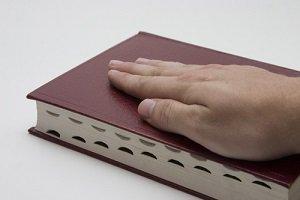Recent Blog Posts
Dealing With Depositions in Illinois Divorces
Posted on March 29, 2016 in Divorce
 In the weeks following the initial divorce filing, the parties will exchange information about their assets and income to determine how marital property is to be distributed and whether either side is entitled to spousal maintenance. If the couple had children, a temporary custody agreement might also be entered into at this point. Often, many disputes about property and child custody can be settled by negotiation, but if a case becomes especially contested, either party may decide that they need to take depositions to pursue their case.
In the weeks following the initial divorce filing, the parties will exchange information about their assets and income to determine how marital property is to be distributed and whether either side is entitled to spousal maintenance. If the couple had children, a temporary custody agreement might also be entered into at this point. Often, many disputes about property and child custody can be settled by negotiation, but if a case becomes especially contested, either party may decide that they need to take depositions to pursue their case.
What Is a Deposition?
A deposition is testimony taken under oath, and your appearance is required if you receive notice that you are to be deposed. A court reporter creates a transcript of the deposition, but depositions are usually taken at an attorney’s office with no judge is present. Attorneys for both sides may ask questions during the deposition about the disputed issues relating to the divorce, or object to irrelevant questions. The general purpose of depositions in a divorce proceeding to uncover information of which the party taking the deposition was previously unaware. Anything said at the deposition may later be admitted into evidence before the court.
Continue Reading ››
A Deeper Look at How New Illinois Laws Affect Paying for College
Posted on March 24, 2016 in Child Support
 A college education is virtually a requirement for a successful career in the twenty-first century, and a divorce does not excuse parents from making every effort to ensure their children receive quality higher education. Illinois law has long provided courts with the authority to require both parents to contribute to the post-secondary educational expenses of their children, and amendments to Section 513 of the newly overhauled Illinois Marriage and Dissolution of Marriage Act outline even more clearly how divorced parents may be ordered to do so.
A college education is virtually a requirement for a successful career in the twenty-first century, and a divorce does not excuse parents from making every effort to ensure their children receive quality higher education. Illinois law has long provided courts with the authority to require both parents to contribute to the post-secondary educational expenses of their children, and amendments to Section 513 of the newly overhauled Illinois Marriage and Dissolution of Marriage Act outline even more clearly how divorced parents may be ordered to do so.
How and When Divorced Parents Pay for College
The first thing the new law on college expenses clarifies is how long parents may be required to contribute to college expenses, previously a point of contention in many cases. The IMDMA now requires parents, when subject to such an order, to contribute to educational expenses until their child’s twenty-third birthday unless “good cause” can be shown otherwise. The law does not define exactly what “good cause” means in this context, but also goes on to clarify that there is absolutely no obligation to provide for educational expenses under any circumstances once the child turns 25.
Other new parts of the law also allow for the early termination of the parent’s responsibility to contribute toward college expenses. As one might expect, there is no requirement to keep paying for college expenses once the child has completed a bachelor’s degree, but the law now also terminates the obligation of the parents if the child marries while still in school. In addition, Section 513(g) also requires students to maintain a “C” average for their parents to contribute toward their schooling expenses, though this requirement may be waived in cases of serious illness or other showing of good cause.
Continue Reading ››
Tax Implications for Spousal Support in Illinois
Posted on March 22, 2016 in Child Support
 April 15 is just around the corner, and that means that it is almost time for everyone’s least favorite day of the year: tax day. While many people think that filing taxes is just a matter of reporting the income they earned from their job last year, income taxes can actually become quite a bit more complicated than that, especially if you have been ordered to pay, or are receiving spousal support.
April 15 is just around the corner, and that means that it is almost time for everyone’s least favorite day of the year: tax day. While many people think that filing taxes is just a matter of reporting the income they earned from their job last year, income taxes can actually become quite a bit more complicated than that, especially if you have been ordered to pay, or are receiving spousal support.
Spousal Maintenance is Considered Income by the IRS
The IRS always considers spousal maintenance received to be income that must be reported when filing taxes. Any person receiving spousal maintenance must also provide their Social Security number to their former spouse as those who pay spousal support may count their payments as a deduction. The IRS uses Social Security numbers to determine who is eligible for the deduction and who must report spousal maintenance as income. Failing to include this information on a tax return may result in a $50 fine.
Continue Reading ››
Receiving a Portion of a Former Spouse’s Pension Through a QILDRO
Posted on March 17, 2016 in Divorce
 Pensions are big money in the state of Illinois. Virtually every public sector employee contributes to one of the state’s 17 pension funds, and almost all police and fire departments have locally administered pension funds. Illinois courts have long held that, in most cases, a pension is marital property that can be distributed to a former spouse in a divorce. However, merely stating that a former spouse is entitled to half of a pension is legally insufficient. The parties must enter a Qualified Illinois Domestic Relations Order (QILDRO) with the court.
Pensions are big money in the state of Illinois. Virtually every public sector employee contributes to one of the state’s 17 pension funds, and almost all police and fire departments have locally administered pension funds. Illinois courts have long held that, in most cases, a pension is marital property that can be distributed to a former spouse in a divorce. However, merely stating that a former spouse is entitled to half of a pension is legally insufficient. The parties must enter a Qualified Illinois Domestic Relations Order (QILDRO) with the court.
What is a QILDRO?
A QILDRO can be incorporated into a marital settlement agreement, or may exist as a separate document. The QILDRO must contain the caption of the divorce case and the name of the pension systems to which the public sector employee belongs. QILDROs can contain either exact dollar amounts or percentages. If the parties opt to include percentages, a separate QILDRO calculation order must be submitted to the court that determines what share of the pension the former spouse will receive.
Continue Reading ››
New Illinois Laws Are Changing Parenting Plan Deadlines
Posted on March 15, 2016 in Child Custody
 On January 1, 2016, the most sweeping changes to Illinois family law in decades went into effect as the legislature amended major portions of the Illinois Marriage and Dissolution of Marriage Act. Attorneys are still grappling with how the law will affect divorce and child custody cases filed in the new year in DuPage County, but it has already become apparent that a few procedural issues still need to be addressed.
On January 1, 2016, the most sweeping changes to Illinois family law in decades went into effect as the legislature amended major portions of the Illinois Marriage and Dissolution of Marriage Act. Attorneys are still grappling with how the law will affect divorce and child custody cases filed in the new year in DuPage County, but it has already become apparent that a few procedural issues still need to be addressed.
Old Approach Left Much Uncertain
Illinois courts have always tried to put children first in divorce cases by encouraging judges to award primary custody in the best interests of the child. However, this has never been an easy task in the early stages of divorce proceedings while the parties are hammering out the details of custody.
The previous version of the Illinois Marriage and Dissolution of Marriage Act (IMDMA) allowed for parties to establish custody while the divorce was pending through a series of temporary visitation and custody orders that could require multiple trips to court to extend and enforce. Parents were encouraged to come up with a custody agreement within 90 days of filing for divorce, or the case would be set for mediation. In many counties, the wait for mediation could be several months, leaving the parties in limbo for quite some time.
Continue Reading ››
Uncovering Financial Infidelity in a Divorce
Posted on March 10, 2016 in Divorce
 Divorcing couples typically have a lot of contention over money. In many cases, this is the one issue that prevents couples from reaching an amicable divorce settlement and keeps divorce cases in court for years. Usually, there is a great deal of money, property, businesses, or other assets at stake. All too often, the thought of having to cash in these assets to split in a divorce is enough to make one spouse commit financial infidelity.
Divorcing couples typically have a lot of contention over money. In many cases, this is the one issue that prevents couples from reaching an amicable divorce settlement and keeps divorce cases in court for years. Usually, there is a great deal of money, property, businesses, or other assets at stake. All too often, the thought of having to cash in these assets to split in a divorce is enough to make one spouse commit financial infidelity.
Financial infidelity is defined as one partner’s secretive act of spending money, having separate credit cards or accounts, or incurring debt without the other partner knowing. In divorce proceedings, it is common to employ an accountant to uncover financial infidelity. On the surface, it may be hard to uncover such behavior, but taking a closer look at certain transactions can shed light on what has been happening behind the scenes. Here are several way in which a spouse can hide assets:
Continue Reading ››
Adoption & Guardianship in Illinois
Posted on March 08, 2016 in Family Law
 For children placed in foster care, there can be an intense desire to be placed in a stable home with a loving family. Over the past decade, programs sponsored by the State of Illinois have helped place over 15,000 children into permanent homes. The decision to bring a child into the home is a life-changing decision for a family and the adopted child. Illinois allows for two processes to take place in order to place a child permanently in a home – adoption and guardianship.
For children placed in foster care, there can be an intense desire to be placed in a stable home with a loving family. Over the past decade, programs sponsored by the State of Illinois have helped place over 15,000 children into permanent homes. The decision to bring a child into the home is a life-changing decision for a family and the adopted child. Illinois allows for two processes to take place in order to place a child permanently in a home – adoption and guardianship.
Adoption is a legal process through which an adoptive parent assumes all rights and responsibilities of a child in foster care, including the care, supervision, and custody of the child, as if the adoptive parent actually gave birth to the child. Adoption terminates the rights of the birth parent. Adoption can occur through one of four avenues:
- Agency assisted adoption – an adoptive parent works with a licensed adoption agency to adopt a child within the United States;
Continue Reading ››
Child Custody and Visitation Under New Illinois Law Changes
Posted on February 29, 2016 in Child Custody

One of the major
changes to the Illinois Marriage and Dissolution of Marriage Act that went into effect on January 1, 2016, addresses not only how the law refers to
child custody and visitation, but also to how parental responsibilities are to be shared between the parents.
A Shift in Thinking
Under the previous law, parents may have had joint custody or one parent may have had sole custody with the other parent granted visitation rights. The parent with sole custody was responsible for making most or all of the major decisions regarding the child’s life unless the parents had agreed otherwise on some issues. With the new changes taking effect, a parent may be allocated decision-making power over one or more of four primary areas of responsibility. However, the court does not have to allocate both parents such authority. The judge’s allocation of decision-making responsibilities to a parent is still based on the familiar standard of the child’s best interest. A judge’s allocation of these responsibilities, however, only happens if the parents do not have an agreement in place as to how these decisions will be made.
Continue Reading ››
The Basics of Marital and Non-Marital Property
Posted on February 25, 2016 in Asset Division
 It has become a common trope in movies and music to portray a wealthy person getting married and subsequently divorced, losing half of his—usually the subject is a man—property to his ex-spouse, regardless of the fact that he owned most of the same assets at the time of the marriage. While such a cliché situation is technically possible under the law in some states, the reality in Illinois is generally much different.
It has become a common trope in movies and music to portray a wealthy person getting married and subsequently divorced, losing half of his—usually the subject is a man—property to his ex-spouse, regardless of the fact that he owned most of the same assets at the time of the marriage. While such a cliché situation is technically possible under the law in some states, the reality in Illinois is generally much different.
Fair Does Not Always Mean Equal
Property division following a divorce in Illinois can be rather complicated, as the law requires marital assets to be divided according to what is equitable and just. While this could result in a clean 50/50 split, there is no guarantee. Rather the specific circumstances of the marriage, divorce, and expected post-divorce realities must be taken into account to determine the appropriate allocation of assets.
Continue Reading ››
Is It a Move or a Relocation?
Posted on February 23, 2016 in Child Custody
 As a divorced or single parent, you understand how challenging it can be to provide all the things your child needs to thrive. In an ideal situation, your child’s other parent would also be committed to helping, both financially and as an active participant in the child’s life. But what happens when you want to pursue opportunities that would force you to relocate to a new city or state with your child? Do you have the right to simply pick up and move? As with most issues of family law and coparenting, the answer depends on the circumstances of your particular situation.
As a divorced or single parent, you understand how challenging it can be to provide all the things your child needs to thrive. In an ideal situation, your child’s other parent would also be committed to helping, both financially and as an active participant in the child’s life. But what happens when you want to pursue opportunities that would force you to relocate to a new city or state with your child? Do you have the right to simply pick up and move? As with most issues of family law and coparenting, the answer depends on the circumstances of your particular situation.
Changing Approach
For many years, the laws in Illinois were fairly subjective about moving with your child. While there was no specific prohibition or distance limitations for an in-state move, if the move presented major obstacles to an existing custody or visitation order, it could potentially be challenged in court. An out-of-state move with a child subject to a custody or visitation order statutorily required the other parent’s consent or an overriding court order.
Continue Reading ››







 In the weeks following the initial
In the weeks following the initial  A college education is virtually a requirement for a successful career in the twenty-first century, and a
A college education is virtually a requirement for a successful career in the twenty-first century, and a  April 15 is just around the corner, and that means that it is almost time for everyone’s least favorite day of the year: tax day. While many people think that filing taxes is just a matter of reporting the income they earned from their job last year, income taxes can actually become quite a bit more complicated than that, especially if you have been ordered to pay, or are receiving
April 15 is just around the corner, and that means that it is almost time for everyone’s least favorite day of the year: tax day. While many people think that filing taxes is just a matter of reporting the income they earned from their job last year, income taxes can actually become quite a bit more complicated than that, especially if you have been ordered to pay, or are receiving  Pensions are big money in the state of Illinois. Virtually every public sector employee contributes to one of the state’s 17 pension funds, and almost all police and fire departments have locally administered pension funds. Illinois courts have long held that, in most cases, a pension is marital property that can be distributed to a former spouse in a divorce. However, merely stating that a former spouse is entitled to half of a pension is legally insufficient. The parties must enter a
Pensions are big money in the state of Illinois. Virtually every public sector employee contributes to one of the state’s 17 pension funds, and almost all police and fire departments have locally administered pension funds. Illinois courts have long held that, in most cases, a pension is marital property that can be distributed to a former spouse in a divorce. However, merely stating that a former spouse is entitled to half of a pension is legally insufficient. The parties must enter a  On January 1, 2016, the most sweeping changes to Illinois
On January 1, 2016, the most sweeping changes to Illinois  Divorcing couples typically have a lot of contention over money. In many cases, this is the one issue that prevents couples from reaching an amicable divorce settlement and keeps divorce cases in court for years. Usually, there is a great deal of money, property, businesses, or other assets at stake. All too often, the thought of having to cash in these assets to split in a divorce is enough to make one spouse commit
Divorcing couples typically have a lot of contention over money. In many cases, this is the one issue that prevents couples from reaching an amicable divorce settlement and keeps divorce cases in court for years. Usually, there is a great deal of money, property, businesses, or other assets at stake. All too often, the thought of having to cash in these assets to split in a divorce is enough to make one spouse commit  For children placed in foster care, there can be an intense desire to be placed in a stable home with a loving family. Over the past decade, programs sponsored by the State of Illinois have helped place over 15,000 children into permanent homes. The decision to bring a child into the home is a life-changing decision for a family and the adopted child. Illinois allows for two processes to take place in order to place a child permanently in a home – adoption and
For children placed in foster care, there can be an intense desire to be placed in a stable home with a loving family. Over the past decade, programs sponsored by the State of Illinois have helped place over 15,000 children into permanent homes. The decision to bring a child into the home is a life-changing decision for a family and the adopted child. Illinois allows for two processes to take place in order to place a child permanently in a home – adoption and  One of the major
One of the major  It has become a common trope in movies and music to portray a wealthy person getting married and subsequently divorced, losing half of his—usually the subject is a man—property to his ex-spouse, regardless of the fact that he owned most of the same
It has become a common trope in movies and music to portray a wealthy person getting married and subsequently divorced, losing half of his—usually the subject is a man—property to his ex-spouse, regardless of the fact that he owned most of the same  As a divorced or single parent, you understand how challenging it can be to provide all the things your child needs to thrive. In an ideal situation, your child’s other parent would also be committed to helping, both financially and as an active participant in the child’s life. But what happens when you want to pursue opportunities that would force you to
As a divorced or single parent, you understand how challenging it can be to provide all the things your child needs to thrive. In an ideal situation, your child’s other parent would also be committed to helping, both financially and as an active participant in the child’s life. But what happens when you want to pursue opportunities that would force you to 
